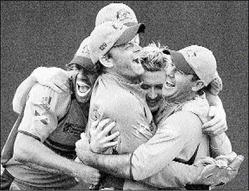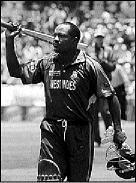
Australia's Michael Clarke (second right) celebrates with teammates Andrew Symonds (left), wicketkeeper Adam Gilchrist and captain Ricky Ponting after taking the wicket of Sri Lanka's Chamara Silva during their World Cup final in Bridgetown on April 28. Reuters photos
LONDON (Reuters);
AS ENGLAND celebrated their unforgettable 2005 Ashes triumph with singular lack of restraint, Australia captain Ricky Ponting silently plotted his revenge.
Retribution was brutal. After winning the Champions Trophy for the first time at the end of last year, Australia regained the Ashes with a 5-0 series win over a demoralised England side.
For the second consecutive tournament they were undefeated in the World Cup and by the start of a four-Test series against India at the end of 2007 they had won 14 Tests in a row and were fast closing in on their own record of 16.
Ruthlessly professional and driven relentlessly by Ponting, Australia started the year by completing a series whitewash over England, whose Ashes campaign never recovered after Steve Harmison's opening delivery flew straight to captain Andy Flintoff at second slip.
Avenged in world cup
Australia's only blip was losing successive one-day series against England and New Zealand, reverses which were both avenged at the World Cup in the Caribbean.
The fifth Test in Sydney became both a celebration and a farewell party for Shane Warne, Glenn McGrath and the gritty little West Australian opener Justin Langer.
In style and personality Warne and McGrath, who took 1,271 Test wickets between them, could not have differed more.
The former, an extrovert bleached blond with a fondness for the good things of life, revived the disappearing art of leg-spin bowling. By the time he left the Test arena for the last time with 708 wickets he was acknowledged as the best wrist spinner of all time.
McGrath, lean, laconic and laidback, continued through the World Cup where his forensically precise fast-medium bowling based on a mechanically perfect action won him the Man-of-the-Tournament award. His final Test haul of 563 was the largest by any pace bowler.
Muralitharan record
By the end of 2007 the supple-wristed Sri Lankan offspinner Muttiah Muralitharan, another unique cricketer, had reclaimed the world record for Test wickets from Warne. Muralitharan's creaking, 35-year-old body may not allow him to reach 1,000 victims, but he could still set an unassailable mark.
The World Cup was marred by the death of Pakistan coach Bob Woolmer who was found unconscious in his hotel room on March 18 in Kingston, Jamaica, after his team's unexpected loss to Ireland.
Police launched a murder inquiry after Jamaican Deputy Police Commissioner Mark Shields announced the 58-year-old Englishman had been strangled, leading to initial speculation that illegal bookmakers on the Indian sub-continent could have been involved.
However, Woolmer also had a number of health problems, including diabetes and high blood pressure, and last month an inquest returned an open verdict.
Early exits for Pakistan and India did not help the tournament. Nor did the decision by the International Cricket Council (ICC) to place ticket prices out of reach of the locals and ban musical instruments, effectively barring the distinctive Caribbean atmosphere they had used to promote the tournament in the first place.
South African Herschelle Gibbs hit six sixes in an over against the Netherlands and Sri Lanka's Lasith Malinga took four wickets in as many balls, but they were rare points in a tournament which admirably organised in nine countries, went on far too long and featured too many forgettable matches.
By contrast, the inaugural Twenty20 World Cup, staged in South Africa and climaxing with victory for India over old rivals Pakistan, was an outstanding success.
Modern twenty20
Although the Twenty20 cricket is weighted overwhelmingly in favour of the batsmen (with England's Stuart Broad conceding six sixes in an over to India's Yuvraj Singh), a fledgling game has developed previously unsuspected subtleties and at around three hours' duration it fits ideally into modern schedules.
Despite the heroics of Warne, McGrath and Muralitharan, batsmen again dominated in 2007, aided by ever-shrinking boundaries and increasingly powerful bats.
Jacques Kallis scored five centuries in seven innings as South Africa concluded the year with series victories over Pakistan and New Zealand after coming from behind to defeat India 2-1 in January.
Sri Lanka's Kumar Sangakkara, relieved of his wicketkeeping responsiblities, scored two double hundreds against the modest Bangladesh bowling, 192 against the much more dangerous Australians, then 152 against England to become the first player to score more than 150 in four consecutive Test matches.
Shiv's numbers
The West Indies, whose Test form goes from bad to worse, at least had Shivnarine Chanderpaul who in a losing series against England recorded a lowest score of 50 and a shortest innings of 130 minutes. At the other end of the spectrum Gilchrist became the first batsman to hit 100 Test match sixes.
India's Sachin Tendulkar moved past Allan Border into second place in the all-time Test run scoring list, behind only Brian Lara.
Lara retired following West Indies' unsuccessful World Cup campaign after a third stint as captain, apparently at odds with his teammates and administrators.
His travails as leader and the lack of discipline he sometimes showed during his career should not obscure the glory of his batting, where at his best he was a thrilling stroke player and an inspired match-winner in seemingly lost causes.
In an era of steady decline for his team, Lara often stood alone, displaying an epic grandeur which should ensure history judges him more kindly than some of his contemporaries.

Brian Lara acknowledges the crowd as he leaves the pitch after his dismissal during their World Cup Super Eights match against England in Bridgetown on April 21. It was the batting great's last ever international match.

